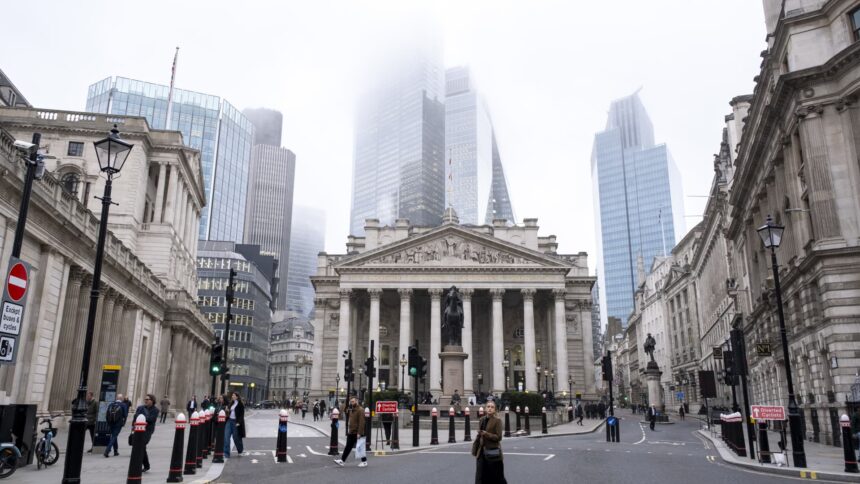View to the Royal Exchange and the City of London where the glass architecture of the 22 Bishopsgate tower is lost in the fog on November 6, 2024 in London, England.
Mike Kemp In Picture | Getty Images
Britain’s motor finance industry is reeling, with analysts warning of a worst-case scenario similar to the country’s costliest consumer banking scandal.
The burgeoning crisis stems back to the landmark judgment of the British Court of Appeal at the end of October, when the court ruled that it is illegal for car dealers to receive bonuses from banks providing motor finance – without asking the customer’s informed consent.
The decision has caught the eye of many in the motor finance industry and appears to have paved the way for a multi-billion pound compensation scheme to compensate consumers.
This has drawn comparisons to the UK’s payment protection insurance (PPI) scandal, which is estimated to have cost banks more than £50 billion ($63.8 billion) and is considered the biggest mis-selling scandal in the country’s financial services history.
Britain’s Financial Conduct Authority, the country’s financial watchdog, said on Wednesday it would write to the Supreme Court to speed up its decision to give lenders the green light to appeal the decision.
Banks left ‘in limbo’
The FCA, which noted that the car finance group may have seen a rise in complaints in recent weeks, said it would consider intervening “to demonstrate its expertise” if leave to appeal was granted.
It urged motor finance groups to consider setting aside financial provisions to deal with the growing number of complaints.
Niklas Kammer, business analyst at Morningstar, said that Britain’s banks have been left in “in limbo” since the October 25 court decision, with Lloyds considered the most risky through the Black Horse business. Barclays also has some light, said Kammer, “but meaningfully less.”
Lloyds Banking Group Plc bank branch in London, England, Monday, October 21, 2024.
Bloomberg Bloomberg Getty Images
“I think it is fair to say that the decision by the Court of Appeal came as a surprise to the banks as well as the FCA. According to the banks, they follow the rules and guidelines established by the FCA, which are not in line with the new Court of Appeal decision,” said Kammer to CNBC via email.
“Thus, there is significant uncertainty in which set of rules banks must be aware of. The FCA has said that it will wait for the outcome of a potential Supreme Court decision before taking a decision on the matter,” said Kammer.
“If the ruling is upheld, the FCA will have to change the rules on disclosure. First, the FCA pointed out that the matter should not take the same proportions as the mis-selling of PPI, but if the new decision, the worst-case scenario will come. close to the same magnitude in impact .”
Lenders ‘likely to withdraw from market’
Benjamin Toms, an analyst of British banks at RBC Capital Markets, said that if the Supreme Court supports the lower court’s decision, the negative impact on the motor finance sector, which includes banks and non-banks, could be up to £28 billion.
“Some lenders tend to pull out of the market, which means less choice and higher prices for those looking to buy a vehicle,” Toms said.
“There is also the potential for legal creep, with other types of credit such as premium finance also coming into the spotlight,” he said.
London Taxis wait in line at a taxi rank outside Fenchurch Street Station on October 14, 2024 in London, England.
John Keeble Getty Images News | Getty Images
In January, the FCA launched a review of the motor finance industry to examine whether there was any misconduct related to the discretionary commission arrangement, or DCA, before it is banned in 2021.
It said on Wednesday that it was now considering the impact of the Court of Appeal’s decision on the review.
Fitch, the influential rating agency, warned earlier this month that it had placed Close Brothers Group on “Rating Watch Negative” due to the lender’s “high exposure” to motor finance.
Other lenders that have been “significantly involved” in motor finance lending include Barclays, Investec, Lloyds and Santander UK, Fitch said.
Lloyds, Britain’s biggest car finance business, has set aside £450 million in financial provisions.




